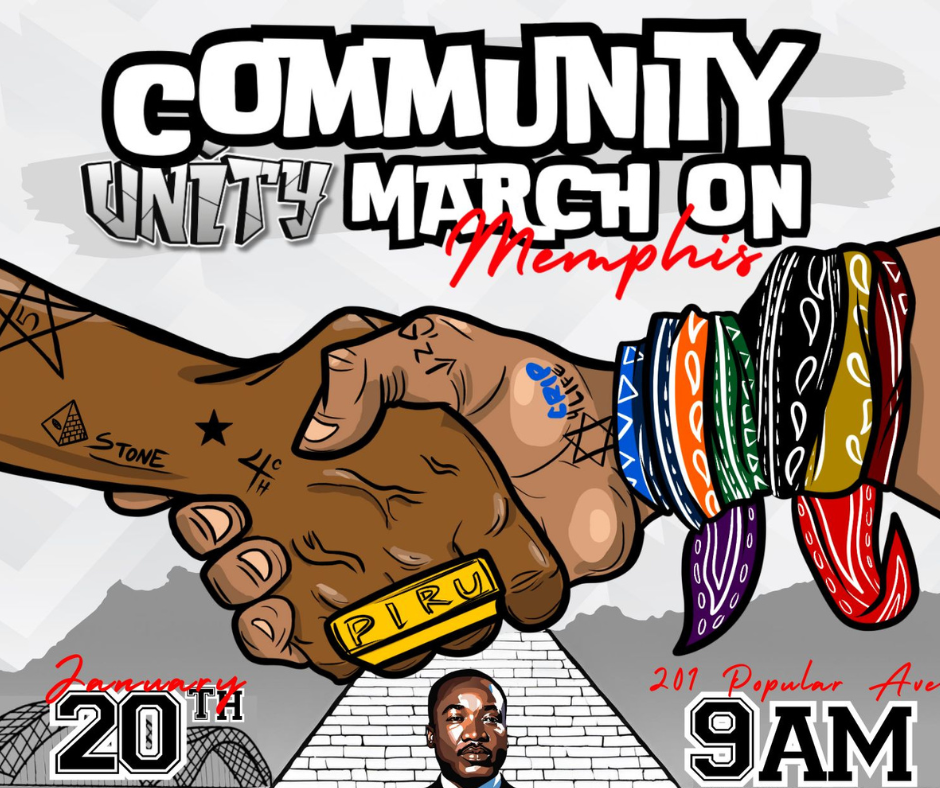Street organizations are continuing their efforts to sustainably integrate themselves into Memphis’ community, while also improving relationships with each other.
The Community Unity March on Memphis is scheduled for January 20th to commemorate Martin Luther King Day on January 20. Participants will begin their day at 201 Poplar with a brief program at 9 a.m. before marching to the National Civil Rights Museum.
This march is a continuation of the Community Unity initiative that seeks to fix citywide problems while also engaging marginalized groups in Memphis.
Community organizer Keedran Franklin has worked with city leaders and the public to change the conversation around what most people call “gangs.”
“We don’t use the word gangs, right,” Franklin said. “That’s code word for local municipalities to get from the feds to say we have a gang problem. We don’t have a gang problem. What we have is under-resourced and underserved people who are creating their own avenue.”
This distinction prompted Franklin to have some “tough” conversations with people, including Mayor Paul Young.
“Mayor Young and myself had to get through some past issues,” Franklin said. “I used to be hard as hell on Paul, back when he was part of HUD(Housing and Urban Development) and MHA (Memphis Housing Authority), I was hard as f*ck on Paul, because he was with the previous regime. We had to work through our bullsh*t first, which was being open and honest.”
Franklin explained that he also took this as an enrichment opportunity and gave the mayor a copy of King David and Boss Daley: The Black Disciples, Mayor Daley, and Chicago on the Edge by Lance Williams, to help him understand that street organizations originated as political ones that were “left behind because of government interference.”
“It’s not about gangs, [the] streets, and killing,” Franklin said. “They’re actually bettering themselves and growing themselves.”
As an organizer across the country, Franklin said his colleagues would call him after these conversations and after spotting Young in places like Mississippi, they spoke highly of him. Franklin said these instances gave Young the opportunity to see these individuals doing work in the community to better themselves, thus helping to change the narrative around them.
“[To Mayor Young] People are all in these spaces man, doing the work that needs to be done,” Franklin said. “That’s it. Just a lot of tough dialogue, and again, just showing and proving that we aren’t as bad as people saying we are.”
Martin Luther King Day not only provides an opportunity for street organizations to continue their work on a more visible level, but an effort to return civil rights to its mission of inclusivity.
Franklin said the day is about both remembrance and community – including that of the streets. He said the initially planned on participating in another march scheduled for that day, but never heard back from organizers when he reached out.
“I was like, well we’ll do our own march,” Franklin said. “You don’t see these types of guys down there. You don’t see the streets at this event. This is to open their eyes to like, ‘hey there’s something that goes on and we should participate in.’ Don’t be afraid to participate.”
The lack of response seemed to work in Franklin’s favor, as it gave way for him and street organizations to create their own event with the support of groups from the community and around the world. He emphasized this is a “multifaceted effort” from both “inside state and federal prisons,” to outside to ensure that all populations are accounted for.
“The idea is us creating this program, creating these new norms, dropping off at 201, and then marching to the Civil Rights Museum where we will also announce these new norms that these organizations have agreed to move by,” Franklin said. “Pushing the effort for us to move, so we can do better by our community.”
